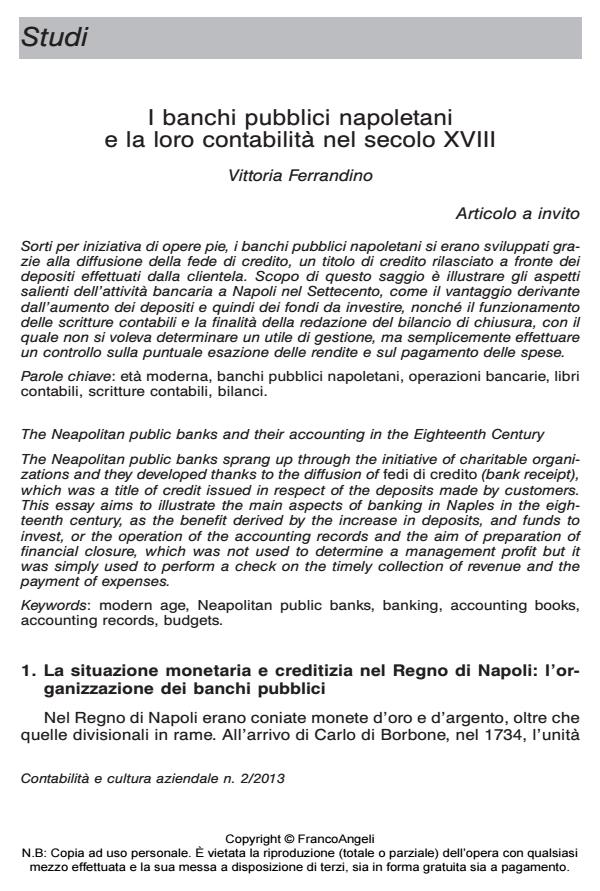I banchi pubblici napoletani e la loro contabilità nel secolo XVIII
Titolo Rivista CONTABILITÀ E CULTURA AZIENDALE
Autori/Curatori Vittoria Ferrandino
Anno di pubblicazione 2014 Fascicolo 2013/2
Lingua Italiano Numero pagine 16 P. 7-22 Dimensione file 99 KB
DOI 10.3280/CCA2013-002002
Il DOI è il codice a barre della proprietà intellettuale: per saperne di più
clicca qui
Qui sotto puoi vedere in anteprima la prima pagina di questo articolo.
Se questo articolo ti interessa, lo puoi acquistare (e scaricare in formato pdf) seguendo le facili indicazioni per acquistare il download credit. Acquista Download Credits per scaricare questo Articolo in formato PDF

FrancoAngeli è membro della Publishers International Linking Association, Inc (PILA)associazione indipendente e non profit per facilitare (attraverso i servizi tecnologici implementati da CrossRef.org) l’accesso degli studiosi ai contenuti digitali nelle pubblicazioni professionali e scientifiche
Sorti per iniziativa di opere pie, i banchi pubblici napoletani si erano sviluppati grazie alla diffusione della fede di credito, un titolo di credito rilasciato a fronte dei depositi effettuati dalla clientela. Scopo di questo saggio è illustrare gli aspetti salienti dell’attività bancaria a Napoli nel Settecento, come il vantaggio derivante dall’aumento dei depositi e quindi dei fondi da investire, nonché il funzionamento delle scritture contabili e la finalità della redazione del bilancio di chiusura, con il quale non si voleva determinare un utile di gestione, ma semplicemente effettuare un controllo sulla puntuale esazione delle rendite e sul pagamento delle spese.
Parole chiave:Età moderna, banchi pubblici napoletani, operazioni bancarie, libri contabili, scritture contabili, bilanci.
- Monti di Pietà of 1500 and the Islamic banks as models of common good Stefano Coronella, Paolo Biancone, Silvana Secinaro, Valerio Brescia, in CONTABILITÀ E CULTURA AZIENDALE 2/2021 pp.9
DOI: 10.3280/CCA2020-002002
Vittoria Ferrandino, I banchi pubblici napoletani e la loro contabilità nel secolo XVIII in "CONTABILITÀ E CULTURA AZIENDALE" 2/2013, pp 7-22, DOI: 10.3280/CCA2013-002002